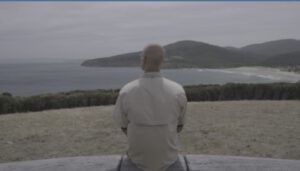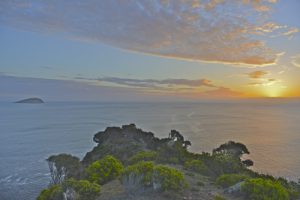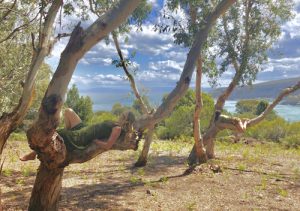Fact one: Nearly all of the immensely tall old growth mountain ash forests in Australia, the eucalyptus regnans, have been logged away. Most of the last remaining virgin stands are in Tasmania, but the trees here are being chipped up, turned to pulp and used for products like toilet paper. The fact that the biodiversity of these forests—as seen from the ground—is being destroyed has been known for some time. However, what is only now being discovered is the rich diversity of life in the forest canopy—that top portion of the trees rarely, if ever, visited by humans.
Fact two: Humans are the only primates that do not spend time in trees. Even gorillas, the largest primate, spend up to 20 percent of their day in trees.

In the fascinating book, The Wild Trees, Richard Preston describes in great biographical, emotional and scientific detail, the new breed of human tree walkers that ascend the tallest trees of the world in their efforts to save them.
The forest canopies of the earth are realms of unfathomed nature, and they are vanishing. The earth’s forests are being logged off, burned away, turned into patches, and reduced to small fragments. We know very little about the forests or about what is happening to them, as little, possibly, as we know about the oceans that surround the continents. We do know that whatever happens to the great systems of nature will also be what happens to us.
The species that live in forest canopies are largely unknown. The forest canopies of the earth are believed to hold roughly half of all species in nature. The forest canopy is the earth’s secret ocean, and it is inhabited by many living things that don’t have names, and are vanishing before they have ever been seen by human eyes.
Kevin Rudd and the Australian Labor party won the federal election this past weekend partially by promising to sign the Kyoto agreement on greenhouse gas emissions. This, in and of itself, is good news and most of the international news media talk about Rudd heralding in a new era of progressive environmental legislation.
I should be happy with this election win, but I am not. As John Howard gave his televised concession speech on election night admitting defeat, I was certainly relieved that he and his nefarious cronies didn’t get back in, but I did not feel jubilant that Rudd and his cronies got in. Why? Because both the Liberal and Labor parties have supported—with a billion dollars of tax payer’s money—the forestry industry in Tasmania and the construction of Gunns Pulp mill.
Kevin Rudd talks about Kyoto and the need to cut back on greenhouse gas emissions, yet he backs a pulp mill that will increase Australia’s CO2 emissions by 2% per year or the equivalent of putting an additional 2 million cars on the road. And, more importantly, the pulp mill will double the amount of trees cut down (80% from native forests) increasing the total yearly tonnage of wood chips to nearly 8 million.
In Preston’s book, tall tree climber and canopy voyager Steve Sillett speaks about the redwood forests in America, but he could be equally talking about Tasmania’s forests when he states:
They were reduced to scraps by us. Our society—and I don’t mean just American society; I mean Chinese, Brazilian, European society, all of us as humans—we are homogenizing the earth’s biosphere. We don’t know what will happen to the biosphere or to the forests. I’m afraid that our work trying to understand the redwood forest might just turn out to be documenting something magnificent before it winks out. This forest gives us a glimpse of what the world was like a very long time ago, before humans came into existence. We are in one of the last great rain forests remaining in the temperate zone. These tiny little pockets are all that’s left of it. We can talk about conserving biodiversity, conserving species, but that isn’t enough. We could keep the redwood species alive as a bunch of little redwood trees, but this forest and all that it shows us would be gone.
If I have one wish about this election it is that Kevin Rudd will go out on a limb and with the force of an angry gorilla losing his tree home sideline the powerful forestry union in Tasmania and preserve what is left of our natural heritage. The original, intact forests in Tasmania were among the most beautiful forests on earth, and they’re almost totally gone. Our human fate rests with the fate of these trees.



You must be logged in to post a comment.